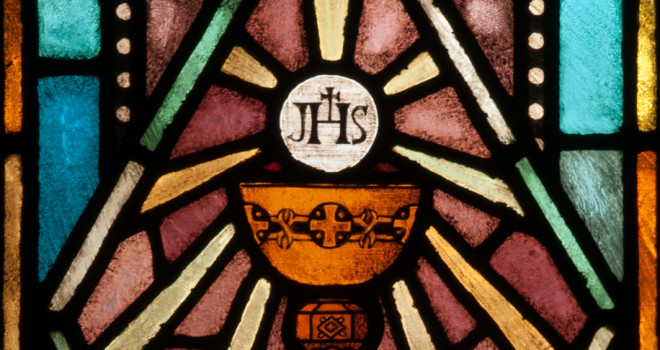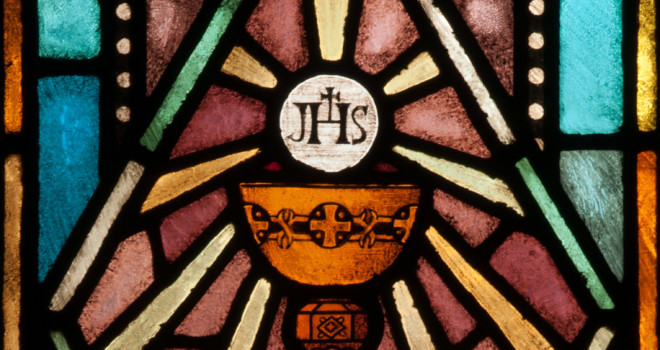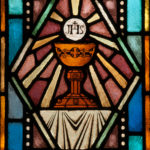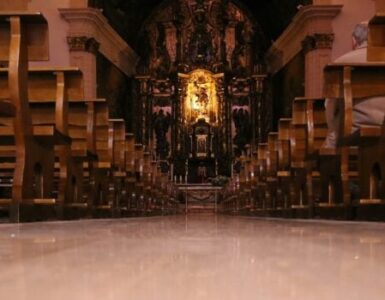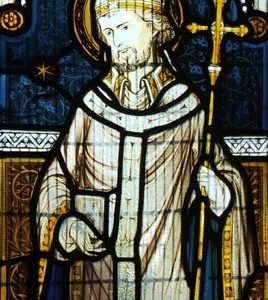“This is My Body, this is My Blood” (Mark 14:22-24). Could there be any better words to hear on Corpus Christi Sunday? The Body, Blood, Soul and Divinity of Jesus. Jesus in the Eucharist, that which every heart has been longing for throughout their lives, knowing it or not. There’s nothing like it, is there, in all of the world. No other act, no other prayer, no other religious experience. Literally, Heaven coming to earth for us.
Our Lord in this Holy Eucharist feeds us and He leads us and He bleeds for us. First, He feeds us in the Eucharist, and that’s the obvious one, isn’t it? Our brothers and sisters of separated Christian communities, they would all agree on that. We have communal meals, everyone knows the image of the Last Supper that’s on the worship aid or on the bulletin. In the Gospel we hear the disciples saying, “Where do you want us to go and prepare for you to celebrate the Passover meal?” (Matthew 26:17) When we hear Passover, of course, we think of that meal that marked the beginning of the freedom from slavery in Egypt, with the slaughtering of the lambs, the sprinkling of the blood upon the doorpost, and also the consumption of its roasted flesh. (See Exodus 12.)
The Lamb was given to them to give them strength on their journey. They were about to make their way out of Egypt in the direction of the Promised Land. And the Eucharist gives us strength on our journeys as well to yes, please God, the Promised Land.
It’s also a meal that reminds me of my Italian Grandma because it’s a meal of abundance. Notice those four verbs that Jesus uses. He takes the bread, He blesses it, He breaks it, and gives it to them. See Mark knew this and he was doing it intentionally. Those four same exact verbs were the ones that Mark chose to use one other time. You remember when it was, right? The multiplication of the loaves and the fish. He took them, He blessed them, He broke them, and He gave it to them. This is not just one meal, but it’s a meal of abundance. There is no shortage. He fed five thousand with a few loaves and a couple of fish. And there’s no shortage of Jesus. We’re not dividing one Body among many. It is that gift which goes on, which is one for all. Christ feeds us with abundance.
He also leads us in the Eucharist. Jesus told the disciples “Go into the city and a man will meet you carrying a jar of water” (Mark 14:13). That can sound like a throwaway line, I know, but it’s very important. Note that, in the first century, men didn’t carry water. Now everyone carries water. But, big jars of water, that was particularly women’s work, unless there was a household in which there were no women. Scholars will debate whether it was community of celibates or whatever, but the important thing was for us to know that this was not some accidental thing like somebody with brown hair or green eyes. Instead this was somebody that Jesus knew about. He was leading the way. He had prepared it and he prepares it for us as well.
He knows where it is that we are to go and how it is that we are to live. And so, literally, He goes with us into the streets in the Eucharistic procession. The Cross, the candles, and the bell, yes, they are out in front, but it is Jesus who is leading the way and acknowledging that He is leading His people. He never abandons us. He literally walks with us. Jesus doesn’t chose the worthy, instead He makes worthy those He chooses. And He walks with us and He leads us.
Finally, He bleeds for us. We call this Corpus Christi, of course, the Solemnity of the Most Holy Body and Blood of Christ. We can never forget the Blood. The readings this day seem to be dripping with it. You know the history of it, I hope, that this feast day was added to the calendar after a miracle that happened back in 1263 back in Bolsena, Italy when a host visibly bled upon the corporal. And they went in procession afterwards.
But go back 2,500 years before that and it was the first Passover when, again, the blood is poured out, again sprinkled on the doorposts. And then fast forward a bit, when they are out in the desert Moses takes the animal sacrifice, takes the blood from it and sprinkles it in two places, one upon the altar—the sign of God—and then, two, upon the very people, the people of God. We can all push back on it, it sounds awful having blood sprinkled upon them. But it was a sign of being bound together. We still use the term sometimes, don’t we? “Blood brothers”—life-blood being shared between two being bound together. How beautiful for the blood to be sprinkled on the doorposts, for the blood to be sprinkled upon the altar, and upon the people. But we don’t stop there. Not just on our objects, not just on our bodies, but into our very selves He pours out His Body and Blood.
He comes to this altar under the appearance of bread and wine, it is true, but it’s not just a symbol, it’s not just a communal meal. It is His life, His Body and Blood. Thus St. Paul says that we must never approach the altar unworthily (1 Corinthians 11:29). If we’re aware of serious sin, we must confess it so that we may receive that great gift. Yes, many in our world will say “You know it’s a nice symbol of Jesus’ life.” Now, I leave you with the quote of Flannery O’Connor, she was at a table with friends where they were saying that very thing, “What a nice symbol it is of the faith.” She said, “If it’s just a symbol, then to hell with it.” No, it is His very life poured out for us so that we may have life.
✠
LAWRENCEVILLE, NJ – October 25, 2017: Stained glass window depicting Eucharist symbols of chalice and host, located in oratory of Notre Dame Convent. Shutterstock/Nancy Bauer


